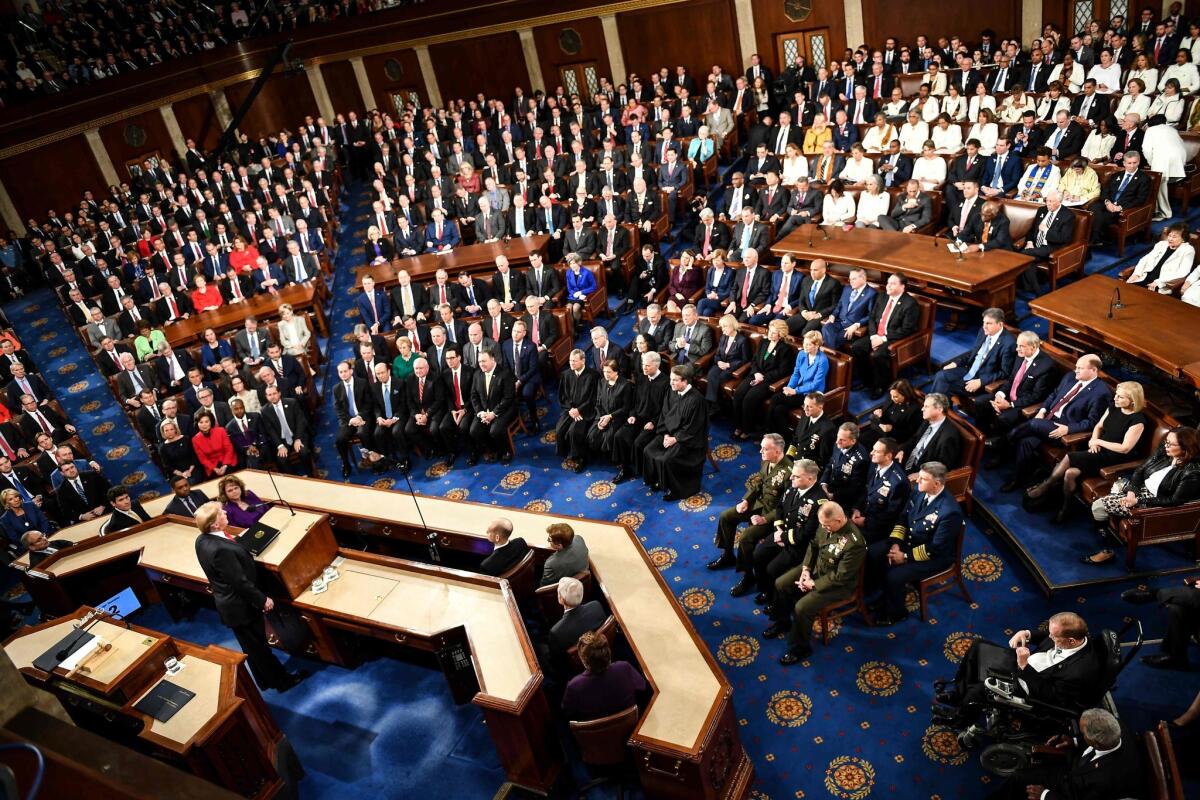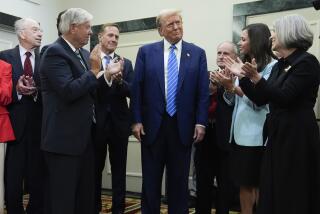Impeachment hangs over Trump’s State of the Union address

- Share via
WASHINGTON — President Trump will give his third State of the Union address Tuesday night in the well of the House of Representatives, the same chamber that impeached him in December for abuse of power and obstruction of Congress.
The Republican-controlled Senate is virtually certain to acquit Trump of both charges on Wednesday, but for now his speech will be notable, in part, because it comes 21 years after President Clinton also addressed a joint session of Congress while his impeachment trial was underway.
Clinton never uttered the word “impeachment” in his 78-minute address, focusing instead on building public support for using the bulk of a $4-trillion budget surplus to shore up Social Security and Medicare.
Trump, who has publicly railed at his impeachment, is unlikely to show similar restraint. But Republicans have made clear they’d prefer he lay out his policy achievements and goals, not his grievances, as they campaign for reelection.
Sen. Lindsey Graham, (R-S.C.), a close Trump ally, was blunt when asked if Trump should discuss impeachment when he addresses Congress and the nation. “I think it would be smart not to,” he said.
“I think most people are ready to move on from impeachment,” he continued. “I would hope he is too, because I am.”
But Trump is unlikely to move on from the stain of impeachment anytime soon. It’s likely to be a mainstay of his reelection campaign, further evidence of what he says is a Democratic “witch hunt” out to thwart his presidency.
“We’re divided and the impeachment process has solidified that,” said Mack McLarty, who served as President Clinton’s first White House chief of staff. “It’s energized both bases.”
“Even if he doesn’t say the word, the entire night will be cloaked in talking about impeachment with the vote the next day,” said Matt Gorman, a GOP operative and former spokesman for National Republican Congressional Committee.
“The State of the Union, which is basically the congressional version of the Olympics opening ceremonies — mostly pageantry — is going to be even more of an afterthought in terms of the substance of the speech,” he added.
For substance, Trump will tout his recent policy gains: a Phase 1 U.S.-China trade agreement, a long-promised revamped North American Free Trade Agreement, low unemployment and continued economic growth, and a drone strike that killed one of Iran’s top generals and drew a limited military response.
“We’ve got a great, strong economy, our military is finally being rebuilt under this administration,” said Sen. Joni Ernst (R-Iowa). “There are a lot of really great things he should talk about and stay away from maybe what the [impeachment] proceedings are.”
In the speech, which staffers have titled “The Great American Comeback,” Trump plans to focus on economic growth, highlighting what a senior administration official previewing the address referred to as a “blue-collar boom,” as well as efforts to aid working families by passing paid medical leave and to push Congress to help lower the cost of prescription drugs.
He will likely contrast his own proposals to make healthcare more affordable with the Medicare expansion plan that some Democratic presidential hopefuls advocate, the senior administration official said. Trump also will focus on his efforts to restrict immigration and protect national security.
Trump plans to offer a vision of “relentless optimism,” the official said, but noted that “no speech is ever final until it’s delivered” and that, with Trump, “it’s never safe to assume anything.”
Trump is almost certain to contrast his accomplishments with what he calls “do-nothing” Democrats obsessed with impeachment.
In his address last February, when he was still under investigation by special counsel Robert S. Mueller III, Trump warned the newly minted Democratic House majority about pursuing “ridiculous partisan investigations.”
“If there is going to peace and legislation, there cannot be war and investigation. It just doesn’t work that way!” Trump said as Speaker Nancy Pelosi and House Intelligence Committee Chairman Adam B. Schiff, (D-Burbank), looked on stone-faced.
He urged lawmakers then to “reject the politics of revenge, resistance and retribution — and embrace the boundless potential of cooperation, compromise and the common good.”
Pelosi announced the House impeachment drive in September and Schiff became the lead House manager in presenting the evidence to the Senate during Trump’s trial.
On Monday, Schiff sought to shame GOP lawmakers for condoning Trump’s actions, again invoking the founders in his closing exhortation: “They gave you a remedy and they meant for you to use it,” he said. “They gave you an oath and they meant for you to observe it.”
The charged emotions inside the Capitol will add to the drama on Tuesday night, but it’s unlikely the televised speech will have much impact once the cameras go off.
“We’ve seen from the last several State of the Union speeches, the effect that it has on the political universe is very temporary,” said Kevin Madden, a former congressional staffer with experience on GOP presidential campaigns. “The message is like cotton candy — it melts almost immediately on contact because the political atmosphere right now is so hot.”
Times staff writers Jennifer Haberkorn and Sarah D. Wire contributed to this report.
More to Read
Get the L.A. Times Politics newsletter
Deeply reported insights into legislation, politics and policy from Sacramento, Washington and beyond. In your inbox three times per week.
You may occasionally receive promotional content from the Los Angeles Times.











